Gastric Sleeve vs. Gastric Bypass vs. Lap Band: Which is The Best Weight Loss Surgery?
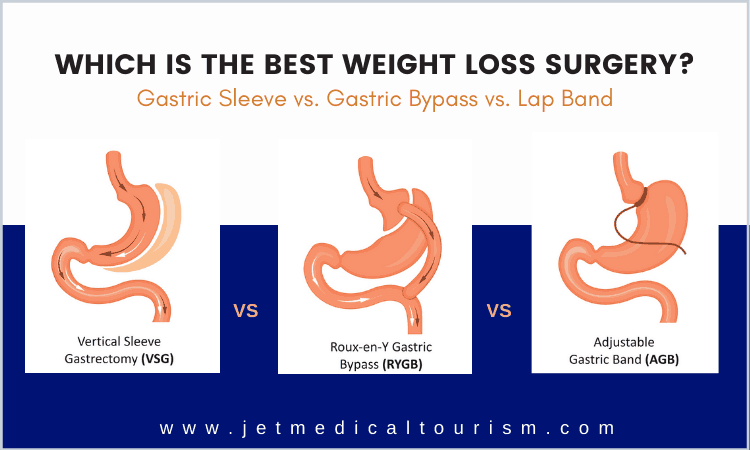
Significantly overweight and obese people struggle with more than numbers on a scale; they are also at a much greater risk of developing heart disease, diabetes, depression, infertility, and even cancer.
Thankfully, an effective solution is available in the form of bariatric surgery. In many cases, patients who undergo a bariatric or weight loss surgery have known to become less dependent on medication for diabetes, sleep apnea, and more.
If you have decided to undergo a bariatric surgery to lose weight and improve your quality of life, the next step is to determine the best weight loss surgery for you. The most common types of bariatric surgery procedures today are gastric sleeve, gastric bypass, and gastric lap-band. In this post, we will go over each option to help you make the right decision.
Want to know which weight loss surgery is ideal for you? Contact Jet Medical Tourism® today and learn about gastric sleeve vs bypass vs lap band surgery.
Gastric sleeve surgery
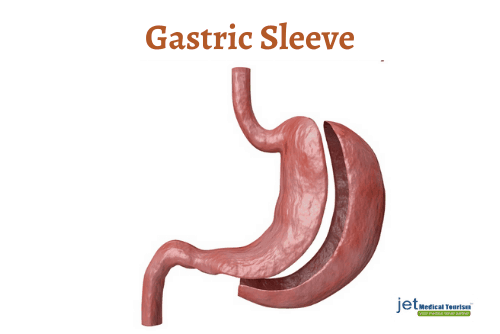 Also known as sleeve gastrectomy, this procedure involves removing part of the stomach and joining the remaining parts together to form a new sleeve-sized or banana-sized stomach. In other words, your new stomach will be about 1/10th the size of your original stomach.
Also known as sleeve gastrectomy, this procedure involves removing part of the stomach and joining the remaining parts together to form a new sleeve-sized or banana-sized stomach. In other words, your new stomach will be about 1/10th the size of your original stomach.
As a result, you will feel full a lot quicker than you did before. If you’ve always struggled with overeating and portion-control, you will be pleasantly surprised to find out that you don’t feel the hunger pangs as intensely and as frequently as before. Gastric sleeve surgery removes the portion of your stomach that is responsible for creating hunger-boosting hormone, ghrelin.
Related: How does gastric sleeve work
You simply won’t be able to eat as much as you did in the past. This factor alone helps majority of patients lose considerable weight within a few weeks, making this procedure one of the best weight loss surgery options.
During the surgery, your bariatric surgeon will make a few tiny cuts in your tummy and insert a laparoscope to remove parts of your stomach. Finally, the remaining stomach will be attached together to form a tube or a sleeve. Unlike lap-band surgery, this procedure is permanent.
Gastric bypass surgery
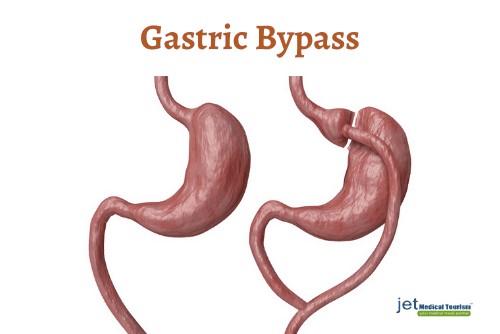 Gastric bypass or Roux-en-Y surgery is another popular option for people who are severely overweight and want to drop the pounds in a fast but health manner.
Gastric bypass or Roux-en-Y surgery is another popular option for people who are severely overweight and want to drop the pounds in a fast but health manner.
During this surgery, the weight loss surgeon creates a little pouch in the topmost stomach. This pouch is the only portion of the stomach that collects the food you consume, and since it is way smaller than your original stomach, the amount of food you can comfortably eat/drink goes down significantly.
The surgeon also connects the small intestine to this new, smaller pouch. So the food goes directly from the stomach pouch into your small intestine, meanwhile the main part of the stomach continues receiving the digestive juices.
Related: Gastric bypass pros and cons
Gastric lap-band surgery
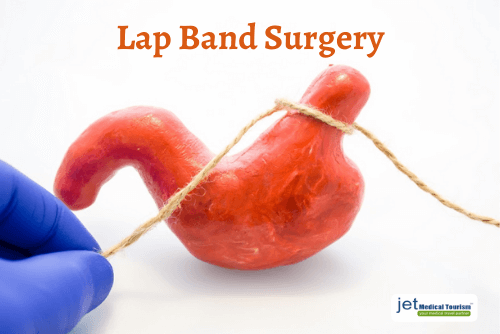 The gastric lap band surgery drastically reduces the amount of food your stomach can hold by placing an inflatable, tiny band around the upper part of the stomach. The band can also be placed laparoscopically, and it restricts how much food you can consume.
The gastric lap band surgery drastically reduces the amount of food your stomach can hold by placing an inflatable, tiny band around the upper part of the stomach. The band can also be placed laparoscopically, and it restricts how much food you can consume.
It controls your digestion process by creating two stomach pouches – the smaller (upper) pouch is where the consumed food is held, and the larger (lower) pouch is where the digested food stays.
Unlike other bariatric procedures, a gastric lap-band does not involve cutting the stomach. Also, in addition to following the post-operative diet, you will need to visit the surgeon regularly to get the band adjusted. As time goes on, your stomach will start getting smaller after getting the band, however, since the band is not self-adjusting, the surgeon will need to do it manually.
Adjusting the lap-band is a very straightforward process that can be done within a few minutes. The lap band contains a saline solution which helps the surgeon to inflate or deflate it to modify the size of the upper pouch (stoma). These adjustment procedures are also performed laparoscopically, with a help of a fine needle.
Related: Should you consider lap band to gastric sleeve conversion surgery?
Now that you have an idea what each bariatric surgery entails, let’s discuss how they are different from each other:
Who is eligible?
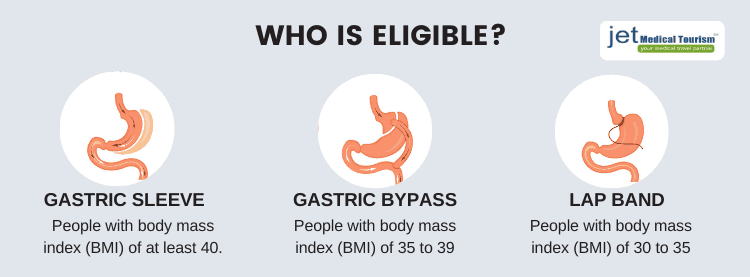
Not every patient will be a good candidate for, say, a gastric sleeve procedure. Here are some important ways to determine whether you qualify for the bariatric surgery you have in mind:
Gastric sleeve
- Gastric sleeve is widely accepted as the best weight loss surgery for people who have a body mass index (BMI) of at least 40. To put it precisely, gastric sleeve is for you if you are 100 pounds or more over your ideal weight.
- People who are too overweight to go for a gastric bypass surgery are also recommended a gastric sleeve. But like everything else in life, exceptions exist, so we recommend consulting with a bariatric surgeon to see whether you’re a good candidate for sleeve gastrectomy.
Gastric bypass
- If your BMI is 35 to 39, and you suffer from a debilitating obesity-related issue such as sleep apnea or type-2 diabetes, then gastric bypass might be best for you. In some cases, an extremely obese patient (with a BMI of 40 or higher) can also qualify for a gastric bypass.
Gastric lap band
- Patients with a BMI of 30 to 35 are a good candidate for lap-band procedure, especially if they are experiencing one or more obesity-related conditions like hypertension, diabetes, breath-related issues, etc.
Cost of weight loss surgery
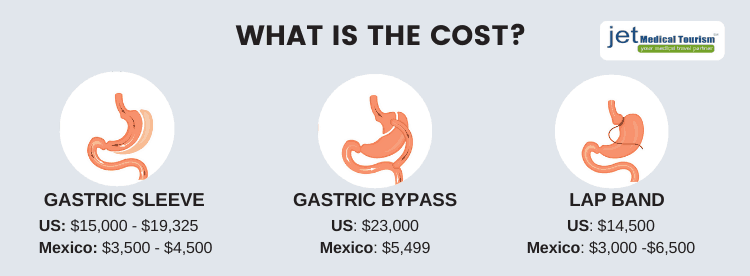
Since the cost of healthcare, including bariatric care, is sky-high in the U.S., many patients prefer to cross the border to receive the same quality of treatments for a fraction of the price in Mexico. Wondering how much the best weight loss surgery will cost you? Let’s take a look.
Gastric sleeve
- The cost of a gastric sleeve surgery in the US is about $15,000 – $19,325, and this doesn’t include airfare or hotel stay if you are planning to go to another city for the surgery.
- However, the same procedure costs around $3,500 – $4,500 in Mexico. At Jet Medical Tourism®, we offer gastric sleeve starting at $3,999 and the package includes ground-transportation, stay in a luxury hotel, pre-op nutrition counseling, meal planning, and more. Learn more here.
Related: How much does gastric sleeve cost?
Gastric bypass
- An inpatient gastric bypass procedure costs about $23,000 in the states, while the same costs an average of $5,499 in Mexico. And like mentioned earlier, this affordable price tag includes everything from hotel stay and pick-up from the airport to nutrition support after the surgery. Apply for it and see if you qualify.
Related: How much does gastric bypass cost?
Gastric lap band
- A lap-band surgery costs at least $14,500 in the US, and that’s the cost of an in-patient treatment. It means you won’t get any nutrition counseling or additional support after the surgery even after shelling out 15 grand for your treatment.
- On the other, an all-inclusive lap-band surgery package at Jet Medical Tourism® costs about $4,000 to $6,500 (if surgeon will perform procedure). Like all the Jet Medical Tourism® bariatric packages, this also includes pre- and post-operation medication, anesthesiologist, blood work, and all the transportation to-and-from the hospital.
Related: Should you get bariatric surgery in Mexico vs USA? Compare risks snd costs
Recovery from bariatric surgery
Gastric sleeve
- The recovery after a gastric sleeve surgery involves both short-term and long-term efforts on the patients’ part.
- Once your operation is done, you will most likely be discharged from the hospital after 1-2 days. It is completely normal to feel soreness in the stomach for a week or two after the procedure. You will be given pain medications to help lessen the discomfort but the pain is nothing major and goes away within a few days.
- The biggest part of recovery after any weight-loss surgery is re-learning how to eat. Your bariatric surgeon will give you a detailed meal-eating guide to follow after the surgery.
- For the first week after your sleeve gastrectomy, you will only be allowed to consume light liquids. After 2 weeks, you will be able to eat soft-pureed foods, and then gradually move to more solid foods.
- It takes about 6 weeks for your stomach to heal after the gastric sleeve, so make sure you don’t engage in any physically-taxing activities during this time.
- To make sure your small stomach doesn’t translate to a nutritional deficiency, you will have to ensure you’re eating nutrient-dense foods most of the time. Depending on your specific case, the doctor may also recommend a vitamin supplement.
- After a few weeks, your surgeon will give you a go-ahead for a light exercise regimen so your weight-loss goals are achieved faster. Regular exercise not only gives your body a toned look, but it also improves your energy levels and reduced depression and anxiety.

Related: What is the recovery time for gastric sleeve surgery?
Gastric bypass
- The gastric bypass patients need to stay in the hospital about 1-2 days, but the hospital stay may get longer if the surgery involved any complications. Once the patient is discharged, they have to start a liquid-only diet and gradually transition to solid foods. Your doctor will give you detailed instructions about how long you need to take the liquids.
- You will be able to get back to your routine activities after 3-5 weeks following the surgery. Expect to feel changes in your bowel movements and digestive system. In most cases, the lap-band patients are also prescribed supplements for essential vitamins and minerals. Make sure you don’t miss the follow-up medical visits!
Related: Gastric sleeve vs gastric bypass
Gastric lap band
- Every patient has a different recovery time, but generally speaking, most lap-band patients are able to return to their desk-jobs 1 weeks after the operation. You can resume all the normal routine activities within 6 weeks.
- A gastric lap-band requires adjustments done over a period of time. Once you undergo the surgery, your stomach will need to heal first before the first adjustment. Mostly, the first adjustment occurs around 8 weeks after the lap-band operation. These adjustments or “fills” are completely painless.
Note: Your body goes through a lot during a weight loss surgery, so you may go through some temporary conditions, like hair thinning/hair loss, dry skin, feeling cold, mood changes, and body aches. These issues completely go away within a couple of months.
Related: Gastric sleeve vs gastric lap band
How much weight will I lose?
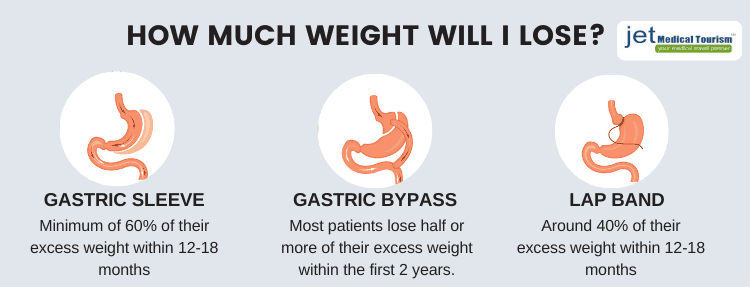
This is perhaps the most important question you might have! The best weight loss surgery will start melting the pounds off of you immediately after the operation.
Gastric sleeve
- Most gastric sleeve patients lose a minimum of 60% of their excess weight within 12-18 months following the surgery. If you continue with the recommended diet and exercise routine, you’ll lose almost all the extra weight within 2 years (even if you are 100 pounds or more overweight right now).
Related: Gastric sleeve results: Expected weight loss after VSG surgery
Gastric bypass
- This procedure may not give you the same dramatic gastric bypass weight-loss results as a gastric sleeve but the results are impressive nonetheless. Most of our gastric bypass patients lose around 8-15 pounds a month in the first year after their operation. This weight loss plateaus over time but if you stick to the right diet and exercise routine, you’ll lose more weight.
- Most patients lose half or more of their excess weight within the first 2 years.
Related: Gastric bypass vs lap band
Gastric lap band
- Initially, the weight loss after a lap-band procedure is quite dramatic and you can lose as much as 2-3 pounds every week. The average weight loss for lap-band patients is 40% of the additional body weight within 12 months after the surgery. After that, the weight loss slows down to 10-20% in the second year.
Weight loss surgery choices are changing
In the past few years, gastric sleeve or sleeve gastrectomy has become the go-to bariatric option for patients around the world. According to the American Society for Metabolic and Bariatric Surgery, gastric sleeve accounts for more than half the bariatric surgeries.
The credit goes to its safety, effectiveness, and many other advantages over other weight-loss surgeries.
For starters, gastric sleeve induces rapid weight loss, and the majority of patients lose around 60% of the extra weight with the surgery alone. Since the procedure restricts the patient’s appetite and the amount of the food they can consume, the result is less calories in.
Gastric sleeve safely removes the part of your stomach that produces ghrelin – a hormone that causes you to frequently over eat. Once ghrelin is out of your system, your appetite naturally goes down and so does your craving to binge on unhealthy snacks.
Another thing that makes gastric sleeve the best weight loss surgery is it doesn’t re-route your intestines (like gastric bypass does). So, the chances of post-operation nutritional deficiencies are minimal. If you remain strict with consuming highly-nutritional foods, you may not even need to take any supplements.
People who don’t want a foreign object embedded in their body – like the gastric lap band – will find gastric sleeve a much desirable option as well.
Studies also show that sleeve gastrectomy is highly effective in curing or improving obesity-related diseases like diabetes, PCOD (in women), sleep apnea, asthma, and high blood pressure.
A gastric sleeve patient also has lesser chance of developing ulcers than a gastric bypass patient.
All these factors have made gastric sleeve a preferred choice among the patients who are looking to lose weight as safely and effectively as possible.
Related: Why gastric sleeve surgery is the best weight loss surgery procedure?
Schedule a consultation with Jet Medical Tourism® today!
Still not sure which is the best weight loss surgery for you? At Jet Medical Tourism®, our bariatric experts are ready to help you. Schedule a private consultation with one of our experienced bariatric surgeons to explore all your treatment options. Call 1-855-506-6188 or leave us a message here.
Other useful resources:
- What is gastric bypass surgery
- How to restart weight loss after gastric bypass
- Lap band removal after 10 years: everything you need to know
- Should you consider lap band to gastric sleeve conversion surgery?
- What is the safest form of weight loss surgery
- How do I find bariatric surgery near me?
- Weight loss surgery cost in Mexico: a comprehensive guide
- What is lap band removal surgery?
- Lap band removal after 10 years: everything you need to know
- Do I qualify for weight loss surgery?
- Gastric bypass vs duodenal switch




